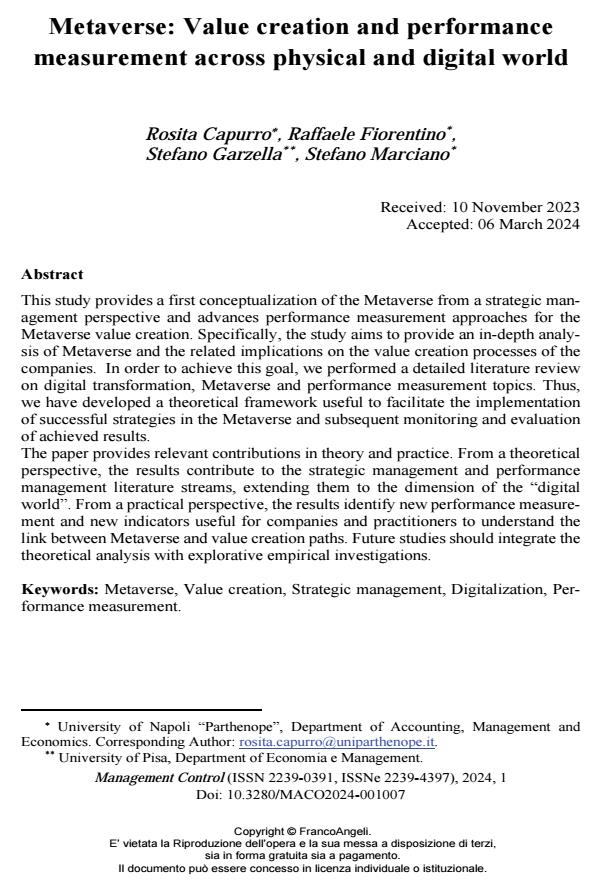Metaverse: Value creation and performance measurement across physical and digital world
Titolo Rivista MANAGEMENT CONTROL
Autori/Curatori Rosita Capurro, Raffaele Fiorentino, Stefano Garzella, Stefano Marciano
Anno di pubblicazione 2024 Fascicolo 2024/1
Lingua Inglese Numero pagine 24 P. 131-154 Dimensione file 455 KB
DOI 10.3280/MACO2024-001007
Il DOI è il codice a barre della proprietà intellettuale: per saperne di più
clicca qui
Qui sotto puoi vedere in anteprima la prima pagina di questo articolo.
Se questo articolo ti interessa, lo puoi acquistare (e scaricare in formato pdf) seguendo le facili indicazioni per acquistare il download credit. Acquista Download Credits per scaricare questo Articolo in formato PDF

FrancoAngeli è membro della Publishers International Linking Association, Inc (PILA)associazione indipendente e non profit per facilitare (attraverso i servizi tecnologici implementati da CrossRef.org) l’accesso degli studiosi ai contenuti digitali nelle pubblicazioni professionali e scientifiche
This study provides a first conceptualization of the Metaverse from a strategic management perspective and advances performance measurement approaches for the Metaverse value creation. Specifically, the study aims to provide an in-depth analysis of Metaverse and the related implications on the value creation processes of the companies. In order to achieve this goal, we performed a detailed literature review on digital transformation, Metaverse and performance measure-ment topics. Thus, we have developed a theoretical framework useful to facilitate the implementation of successful strategies in the Metaverse and subsequent mon-itoring and evaluation of achieved results. The paper provides relevant contributions in theory and practice. From a theoreti-cal perspective, the results contribute to the strategic management and perfor-mance management literature streams, extending them to the dimension of the “digital world”. From a practical perspective, the results identify new performance measurement and new indicators useful for companies and practitioners to under-stand the link between Metaverse and value creation paths. Future studies should integrate the theoretical analysis with explorative empirical investigations.
Parole chiave:Metaverse, Value creation, Strategic management, Digitalization, Per-formance measurement.
- The Great Filter? A Preliminary Study on Metaverse and Sustainable Food Consumer Nadia Palmieri, Flavio Boccia, Assunta Di Vaio, Daniela Covino, in Sustainability /2025 pp.2069
DOI: 10.3390/su17052069
Rosita Capurro, Raffaele Fiorentino, Stefano Garzella, Stefano Marciano, Metaverse: Value creation and performance measurement across physical and digital world in "MANAGEMENT CONTROL" 1/2024, pp 131-154, DOI: 10.3280/MACO2024-001007